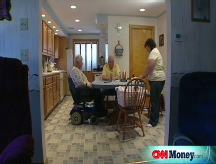Soda tax, tuition hikes: State budget cuts sting
New York slashes services and raises taxes and fees to close $13.7 billion deficit. Other states likely to enact similar measures.
NEW YORK (CNNMoney.com) -- An 18% sales tax on non-diet soda. A 14% hike in public college tuition. The elimination of a tax rebate for homeowners.
These are but a few of the Spartan steps New York state Gov. David Paterson proposed Tuesday to close a projected record $13.7 billion deficit in the state's 2009-2010 budget. A broad swath of New Yorkers -- from school children to Medicaid recipients to transit riders -- will see cuts in their services. Meanwhile, drivers and parkgoers will pay higher fees.
"Change is never easy, but it is the only way we can put New York back on the road toward fiscal and economic recovery," Paterson said in a message to residents posted on the New York state Division of the Budget Web site. The budget "seeks shared sacrifice from all New Yorkers and includes reductions across virtually every area of government."
New Yorkers won't be alone in feeling the sting of budget cuts and tax increases in the coming year. States across the nation are struggling to cope with declining revenues at a time when demand for state services is increasing.
Some 26 states estimate they will have budget gaps in fiscal year 2010, which starts July 1 for the majority of states, according to the National Conference of State Legislatures. The deficits amount to a combined $65 billion.
New York officials must deal with their problems earlier than most since the state's fiscal year starts on April 1. And while the Empire State is feeling the pain of Wall Street's turmoil more acutely than its peers, other states are confronting similar problems.
"New York is a harbinger of what many states will be facing in coming months," said Robert Ward, deputy director of the Rockefeller Institute of Government. There will be "unpleasant news on both the tax side and the spending side."
Governors and other state officials are looking to Washington to help close their gaps, though they aren't counting on it. They are pressuring President-elect Barack Obama to quickly pass a stimulus package, which could provide funding for infrastructure projects, Medicaid and food stamp programs, among other items.
New York is bracing for an estimated 6.6% drop in its general fund tax revenues for 2009-2010. It expects to lose 180,000 jobs and see the state unemployment rate climb above 7% in 2009, up from 5.7% in October.
Like its peers, New York is facing a triple tax whammy: personal income tax revenue is declining as people lose their jobs and bonuses; corporate income tax revenue is shriveling as business profits dry up, and sales tax revenue is falling as shoppers rein in their spending amid the weakening economy.
The state is also very sensitive to the fortunes of the financial services sector, which accounts for 20% of state tax revenue and isn't in the best of health at the moment.
This downturn -- which has opened a $1.7 billion shortfall in the current budget and a $13.7 billion deficit for the coming year -- is forcing state officials to take drastic measures.
The steps include:
- Reducing state aid to local school districts by 3.3%
- Shaving $11.6 million from senior services program
- Limiting the increase in Medicaid spending to 3.8%, down from 12%
- Laying off 521 state workers
- Closing prison camps, youth facilities and the Manhattan Addiction Treatment Center
- Eliminating the sales tax exemption on clothing under $110
- Imposing a sales tax on cable and satellite TV and radio
- Subjecting manicures, massages and haircuts to sales tax
"There simply isn't the money to provide the services we all would like," Ward said.
States nationwide have been slashing spending for months. Some 31 states had a cumulative $40.3 billion shortfall going into fiscal year 2009, and new gaps have opened up in 38 states mid-year.
In response, they've scaled back funding for K-12 education, higher education, corrections, Medicaid and local governments. Some have also trimmed their workforces or established hiring freezes.
Fiscal year 2010 is expected to be worse, experts said. Deficits are expected to balloon beyond the combined $65 billion reported by 26 states. This will likely provoke some heated debates when state officials gather in their respective capitols for budget talks this spring.
"States are going to have to make tough decisions in their budgets," said Elizabeth McNichol, senior fellow, Center on Budget and Policy Priorities.
At this point, states are trying to close the gap mainly through spending cuts, said Corina Eckl, fiscal program director at the National Conference of State Legislatures. Few are talking about widespread tax hikes.
But this may not last as their economic condition continues to weaken and their programs are cut to the bone, experts said.
Even when the national economy turns around, states will likely continue to struggle. They often lag the country both going into and coming out of a recession, Eckl said.
"The problems we are seeing today could pale compared to what we'll see in 2010," she said. "All bets are off for [fiscal year] 2011." ![]()






